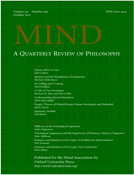-
Views
-
Cite
Cite
Michael Della Rocca, Spinoza and the Metaphysics of Scepticism, Mind, Volume 116, Issue 464, November 2007, Pages 851–874, https://doi.org/10.1093/mind/fzm851
Close - Share Icon Share
Abstract
Spinoza's response to a certain radical form of scepticism has deep and surprising roots in his rationalist metaphysics. I argue that Spinoza's commitment to the Principle of Sufficient Reason leads to his naturalistic rejection of certain sharp, inexplicable bifurcations in reality such as the bifurcations that a Cartesian system posits between mind and body and between will and intellect. I show how Spinoza identies and rejects a similar bifurcation between the representational character of ideas or mental states and the epistemic status of these ideas, a bifurcation to which Spinoza sees the radical sceptic committed. Spinoza's rejection of this bifurcation helps to explain some of his most cryptic statements concerning scepticism and also reveals a promising and highly metaphysical strategy for understanding and responding to scepticism.



